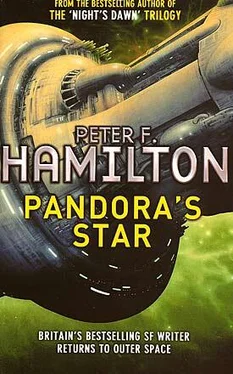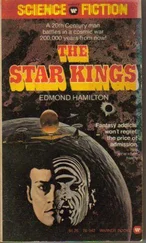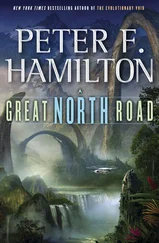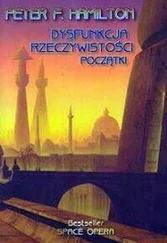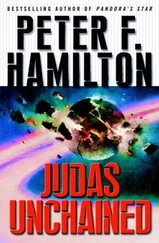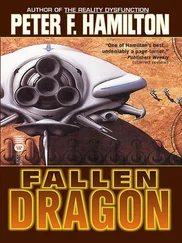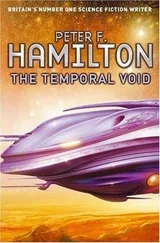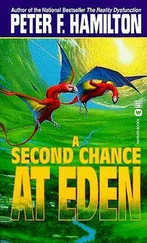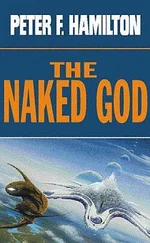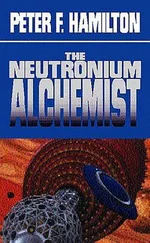Peter Hamilton - Pandora's Star
Здесь есть возможность читать онлайн «Peter Hamilton - Pandora's Star» весь текст электронной книги совершенно бесплатно (целиком полную версию без сокращений). В некоторых случаях можно слушать аудио, скачать через торрент в формате fb2 и присутствует краткое содержание. Жанр: Фантастика и фэнтези, на английском языке. Описание произведения, (предисловие) а так же отзывы посетителей доступны на портале библиотеки ЛибКат.
- Название:Pandora's Star
- Автор:
- Жанр:
- Год:неизвестен
- ISBN:нет данных
- Рейтинг книги:5 / 5. Голосов: 1
-
Избранное:Добавить в избранное
- Отзывы:
-
Ваша оценка:
- 100
- 1
- 2
- 3
- 4
- 5
Pandora's Star: краткое содержание, описание и аннотация
Предлагаем к чтению аннотацию, описание, краткое содержание или предисловие (зависит от того, что написал сам автор книги «Pandora's Star»). Если вы не нашли необходимую информацию о книге — напишите в комментариях, мы постараемся отыскать её.
Pandora's Star — читать онлайн бесплатно полную книгу (весь текст) целиком
Ниже представлен текст книги, разбитый по страницам. Система сохранения места последней прочитанной страницы, позволяет с удобством читать онлайн бесплатно книгу «Pandora's Star», без необходимости каждый раз заново искать на чём Вы остановились. Поставьте закладку, и сможете в любой момент перейти на страницу, на которой закончили чтение.
Интервал:
Закладка:
Oscar sat back and had his first in situ break of the day. A trolleybot slid along the console rows, distributing drinks and snacks. He claimed a cheese and smoked bacon sandwich and a couple of bottles of natural mineral water. As he ate, the screens above the windows came alive with images from the satellites. Details were gradually sketched in by the data tables and graphics in the console portals.
The planet had five major continents, accounting for thirty-two percent of the surface. Temperature was lower than strictly favorable, resulting in huge ice caps that between them covered a third of the planet. One and a half continents were completely buried beneath ice. That left a lot less usable land than average. The magnetic field was stronger than Earth’s, which gave it a very large Van Allen radiation belt.
“There is no evidence of sentient life at this time,” alien encounter said. “No large-scale structures, no electromagnetic activity, no visible cultivation, and no artificial thermal sources.”
“Thank you,” Oscar said. The last factor was the clincher for him. The ability to start and use fire was deemed the litmus test of sentience. If anything on the planet was capable of sentient thought, it was currently below Neanderthal-equivalent. “Sensors, you can switch to active scanning now.”
Radar sweeps started to penetrate the pervasive cloud. The images on the big screens began to develop a lot quicker, with detailed layers building on the provisional outlines. Lasers swept through the atmosphere, plotting its composition. The RI manipulated the energy flow through the gateway mechanism, manufacturing tiny gravity wave distortions at the wormhole exit. They rippled through the planet’s crust, allowing the satellites to determine its internal layout.
At fifteen hundred hours, Oscar called an intraloop conference with his station heads. So far, they agreed, the planet appeared to be hospitable. There was definitely no sign of an indigenous sentience. No animals above two meters in length had been spotted by the infrared sensors. Its geology was standard. Its biochemistry, as far as could be deduced from spectrography, was an ordinary carbon-based multicellular form.
“So, is it aggressive or passive?” Oscar asked. The problem was common enough. On a colder world such as this, most life would be slow-growing, a trait that inclined toward a more passive animal nature. Although there were cases where the opposite was true, and evolution had produced some very tough life-forms geared for survival at all costs. “Best guesses please.”
“The geology is stable,” planetary science said. “The current bio-epoch is probably about eighty million years old if we’re reading the stellar cycle right. We can’t detect any previous ice ages, so there’s been no sudden climate change to throw their evolution off-kilter. Everything growing down there is stable and adjusted. I’d say passive.”
“I have to agree,” xenobiology said. “We’re seeing small movable thermal spots indicative of animals, but nothing larger than a dog. Certainly nothing we normally associate with carnivorous predators. Botany is also reasonably standard, though there are few large plants, and what passes for trees are solitary, they don’t congregate in forests, which is unusual.”
“Very well.” Oscar swiveled his seat until he could see McClain Gilbert, the forward crew chief, sitting at the front of the observation gallery. “Mac, I’m giving you an initial encounter authorization. Get your first contact team suited up.”
“Thank you, sir.” McClain Gilbert gave him a thumbs-up from behind the glass.
Oscar switched back to the full loop. “We’re going for a ground encounter. Sensors, put the geophysics satellites to automatic, and withdraw all the arms. Astrogration, I want the exit moved to a five-hundred-kilometer equatorial altitude, then give it an orbital velocity. When we’re established, launch the low-orbit surveillance satellite fleet; I’ll need constant coverage of the ground contact site. We’re aiming for ground opening in one hour, people, get ready for that. Planetary Science, find me a suitable dawn site at that time.”
With the exit positioned five hundred kilometers above the ground, the clouds below seemed a lot brighter. The small squadron of low-orbit satellites shot off the launch rail, curving down to an even lower altitude and spreading out to form a chain around the planet’s equator. Images from their high-res cameras appeared on the screens, revealing a wealth of details. Stones a mere five centimeters across were visible amid the carpet of vermilion grass-equivalent. Squirrellike rodents, with gray scales rather than fur, bounded about, scuttling into burrows and swimming along streams. All the small independent trees had peculiar zigzag branches.
“Confirming low-orbit satellite fleet in position,” sensors reported. “We have full coverage.”
“Coming up to dawn on the landing site,” planetary science said.
“Withdraw sensor arms,” Oscar said. “Chamber Management, establish a force field across the gateway. Astrogration, reposition the exit one kilometer above designated contact site, horizontal axis.”
The wormhole blinked, and they were looking down on a gently crumpled landscape of thin burgundy grass and twisted carmine bushes. A low dawn light was casting long gloomy shadows across the ground. Pools of dense mist clung to hollows and depressions with oily tenacity.
“Chamber Management, equalize pressure. Sensors, deploy the atmospheric probe and exposure samples.”
The force field reconfigured itself to allow the sampler arm through. It didn’t find any immediately lethal particles missed by the scans from orbit.
Oscar waited the designated hour for the exposure and micro-analysis processes to run. “Xenobiology?” he asked eventually.
“Some spores—probably plant life. Small bacterial count in the water vapor. Nothing abnormal, and no adverse reactions to our sample materials.”
“Thank you.” It would take months of laboratory testing to discover if any of the microbial life was dangerous to humans. Until they were given the all-clear, the forward crews would all be in suits anyway. It was the other biological reactions that worried Oscar. A century ago CST had opened a wormhole to a planet where the local fungus ate polymers. Quite how that evolved was still a puzzle for the xenobiologists. Now a whole spectrum of materials was exposed to the planet first. “Astrogration, please take us down to the surface.”
The exit began to move, drifting downward with the same sedate lack of urgency as a hot air balloon. Oscar could even guess the point that astrogration had chosen for contact. A flat patch of ground clear of any trees, with a stream three hundred meters away. Ground search radar confirmed the area was solid. At a hundred meters up, the oval exit began to rotate around its long axis, tilting to the vertical. A light blue sky slid into view, with wispy clouds high above the horizon, glowing pink in the rising sunlight. Astrogration halted the descent when the bottom rim was a couple of centimeters above the fluffy leaves of the cochineal-tinted grass-equivalent.
Oscar let out a breath as he watched the landscape for any sign of movement. If there were any Silfen on this world, now was the moment they appeared. Stupid lanky humanoids ambling up to the opening and waving gamely at all the ground crew behind their consoles. “Welcome,” they sang in their own language. “Welcome to a new world.” He’d seen it once himself, twelve years ago when he was chamber management station head on Augusta. There had been so much amusement in their smooth voices, laughter for the serious humans and their clunky machinery. He’d wanted to pick up a rock and throw it at the smug mystics.
Читать дальшеИнтервал:
Закладка:
Похожие книги на «Pandora's Star»
Представляем Вашему вниманию похожие книги на «Pandora's Star» списком для выбора. Мы отобрали схожую по названию и смыслу литературу в надежде предоставить читателям больше вариантов отыскать новые, интересные, ещё непрочитанные произведения.
Обсуждение, отзывы о книге «Pandora's Star» и просто собственные мнения читателей. Оставьте ваши комментарии, напишите, что Вы думаете о произведении, его смысле или главных героях. Укажите что конкретно понравилось, а что нет, и почему Вы так считаете.
